WordPress is the CMS of choice for over 26% of all websites online. That’s a fairly sizeable number considering how many websites currently exist. Squarespace on the other hand powers around 1.4 million websites and it’s reported that their market share is less than 1%.
So why use it? Well the advantages of using Squarespace is that it removes some of the hassle for business owners who are often attracted by low costs, the ability to use pre built themes and drag and drop style development. To summarise:
- It’s easy to update
- It has solid features and functionality
- It has SEO optimisation features built into the CMS.
Rand Fishkin from Moz even gives it a rather glowing endorsement for SEO.
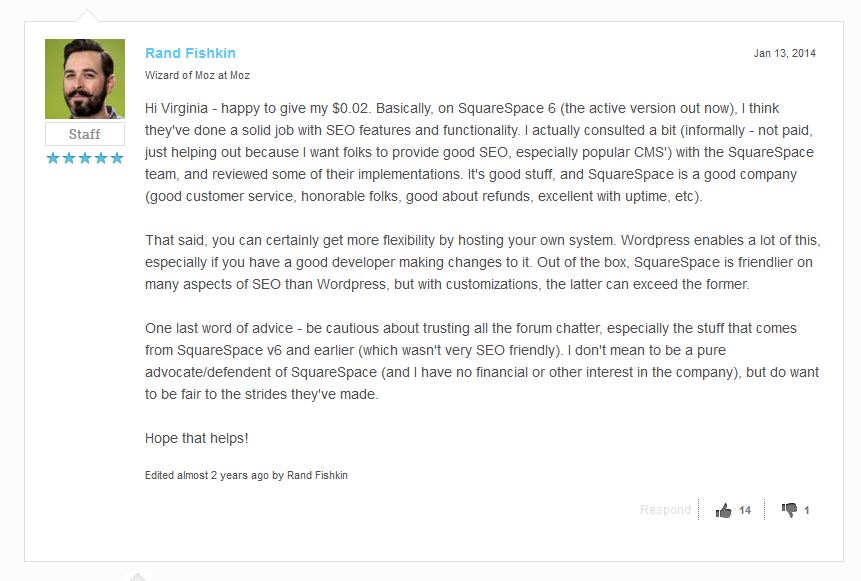
But you’re probably wondering is choosing Squarespace the right for my business? Will it really be a sustainable solution for you in terms of SEO and growing your business online?
Let’s discuss how SS might impact your online business and some of the key points when comparing Squarespace vs WordPress SEO.
The Dual Purpose Description Field
The first issue I ran into when attempting to optimising a Squarespace site was the Description field. Squarespace provides us with the ability to control the Meta description, the grey text in Google, using the Description field (shown below). This is where it gets confusing though when SS however highlights that “Some templates surface this description, for instance in the header area. Furthermore, it’s used if this page is indexed by a search engine.“.
This should never be the case and I’ll explain why.
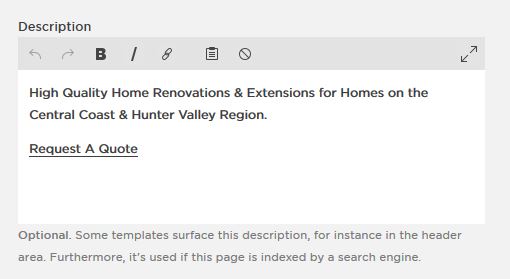
The Meta Description and on page copy, such as the text in a header, are serving two completely different purposes.
Your Meta is used for relavance to a variety of search terms while providing a summary of the page and a call to action to encourage click throughs. Using keyword research you can identify groups of keywords that visitors might use to find products and services like yours. By using these search terms in your description will undoubtedly improve your relevance for a wider number of searches.
Your Meta Description can be 160 characters in length.
On the other hand on-page copy should be written first and foremost for your visitors, never write for search enges. More often than not text within the header is used to summarise the product or service you’re offering and may also include a call to action such as “request a quote” button as shown in the example below.
You also need to treat the ‘above the fold’ on your site carefully because it’s critical for conversions. It’s the first part of your site visitors will view without needing to scroll. The more space used for your header means the less visible content is below. Here is an example of what it looks when your Meta description because part of the header.
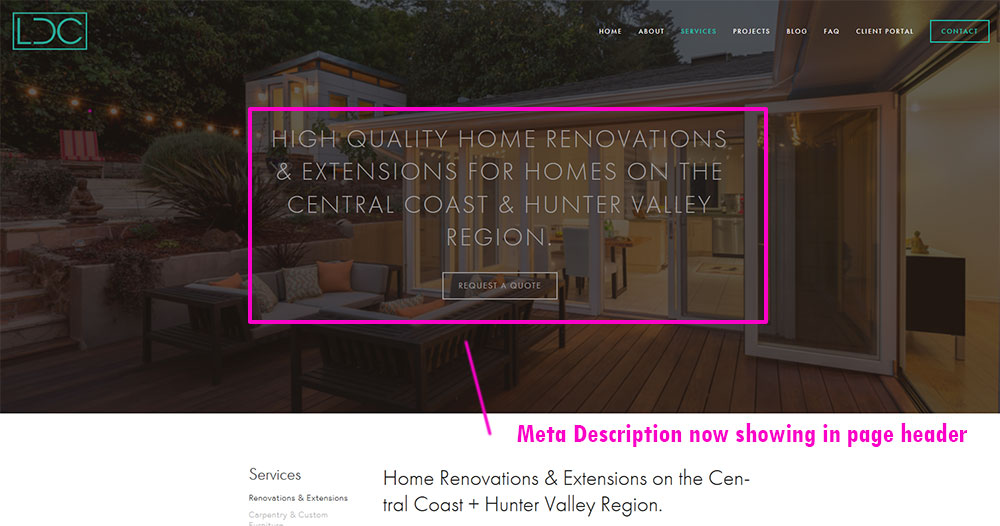
Although not entirely unusable using a Meta description in your header is not ideal.
- Your header now takes up more of your critical conversion area.
- It feels like it’s been written for search engines and not your visitors.
- To be within guidelines your header text must be greater than 130 characters.
It’s a problem because let’s say you just want it to be “Quality & affordable Home Renovations & Extensions” for your head then your Meta Description is set to the same. Using a short Meta description means you’ll be below the recommended character count plus you lose out on relevance because you’re not using a combination of product, location and service based keywords.
So what are your options:
- You could use a different theme that doesn’t have this issue. The above example is using the Hayden theme.
- You could remove the header image and therefore the text will be removed too. (note – you’ll also lose the call to action button displayed in the header)
- You could gain developer access to Squarespace and modify the code (untested and not sure if it’s possible)
I also read a number of posts talking about Ajax and JavaScript code that can be injected into the header / footer to modify Meta Descriptions however every solution I tested was unsuccessful. If you have a solution that works please let me know in the comments below.
Others also suggested adding the following into Page Settings > Advanced > Page Header Injection Code field
<meta name="description" content="your meta description.">
This doesn’t overwrite the meta tag however it simply creates a second one. As it’s the second tag within the code Google will ignore it.
Why WordPress is better?
Using plugins within WordPress such as Yoast means that we can control the Meta fields for Google irrespectively of any on page content, this is the ideal solution.
Squarespace Search Engine Description & The Duplication Dilema
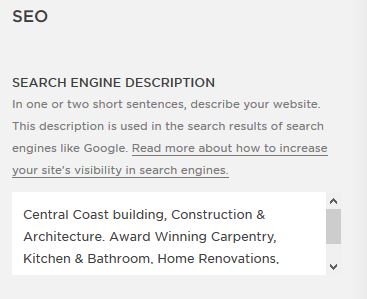
Squarespace provides a feature to control the Meta Title & Meta Description for all of your pages, most importantly for your home page, you’ll find it in Settings -> Marketing -> SEO.
For the home page this actually solves the dual purpose description field dilemma because we can now set the description of our Homepage, in Google, irrespective of the Description field.
So what’s the big problem?
The problem occurs when you don’t set the Description field for an individual page. That’s when Squarespace tries to be clever and automatically set the page description to the text you’ve placed in the Search Engine Description field.
Every page that doesn’t fill in the Page Description field will have the same description shown in Google. This is bad.
Google says this:
“The way I think of it is you can either have a unique meta tag description, or you can choose to have no meta tag description, but I wouldn’t have duplicate meta tag descriptions”
Silva Bokis has a great write-up on why he removed the Squarespace SEO Description and why we should too. He explains this issue very well.
This field still has value however because it allows us to set a unique description for your home page in Google without worrying about affecting content that is visible to our visitors. If you use this field however you’ll need to commit to setting a unique Page description for each new page you create. Easy enough as long as you stick with it and it’s best practice anyway.
If this seems like too much effort then it’s best to remove it completely and avoid the duplicate content issues.
Improving Speed & Performance
Speed and performance is important too.
Nnot only because it’s a component of the ranking algorithms but also for the benefit of your visitors. In fairness to Squarespace most WordPress themes would perform badly by default but the difference with WordPress websites is that we can use free plugins to improve it.
Essentially you’re renting your website from Squarespace, i.e. they’re in full control, and as an end-user we have no ability to optimise the performance.
Renting a website from Squarespace also means that you’re sharing a server with many other SS websites. Shared hosting environments are challenging to control your performance and load times can vary significantly because more demanding websites are using all the resources.
Although in most cases the performance of Squarespace was solid I did experience one period where the site I was working upon became completely unresponsive for a period of time. I confirmed that all other pages I tested at that time loaded quickly so I can only presume this was a SS issue.
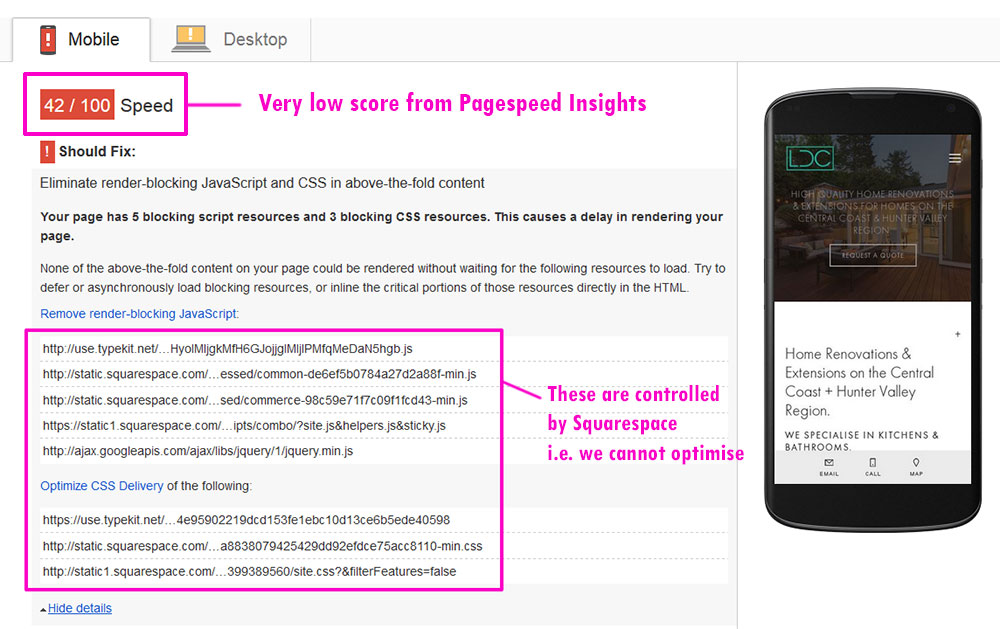
Will Squarespace hurt your rankings?
The answer is….”well, that depends”.
I’m constantly recommending to businesses that they build their website on solid foundations, using SS means that you need to make some compromises which personally doesn’t sit well with me. The online space is incredibly competitive and it doesn’t make any sense to make compromises when you don’t have to.
Secondly, I like to be in control. I don’t want to wake up one day and find that SS no longer exists, for whatever reason, and therefore my website can’t be found. Remember you’re only renting your website from SS so they have complete control and changes to their business could have a significant impact on yours.
Can a SS website still perform? Of course.
Many of the aspects of SEO still stand such as building authority with relevant content and quality backlinks. The more content you have the more visitors you’re likely to attract. Quality links to your website can still have a huge impact to your search rankings which means if you continue to focus on building quality links then you’ll undoubtedly see an upwards affect to your rankings too.
At the end of the day I recommend WordPress, it’s a comprehensive solution which allows you to be in full control and without compromise. That’s not to say that WordPress or pre purchased themes don’t need a little bit of love and attention but with WordPress you will have the control to build rock solid foundations, have easy updating and you’ll continue to keep your costs affordable.


